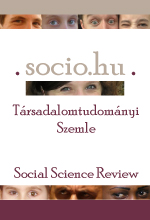Az anómiától a társadalmi szenvedés fenomenológiájáig
From anomy to the phenomenology of social suffering
Author(s): Domonkos SikSubject(s): History and theory of sociology
Published by: MTA TK Szociológiai Intézet
Keywords: social suffering; Durkheim; Habermas; Honneth
Summary/Abstract: Even if the positivist Durkheim did not imagine sociology as a critical science, his notion of anomie became central for critical theories. The article analyses why this happened and what the broader consequences of Durkheim’s theorizing are for contemporary critical theories. On the one hand anomie is related to the problem of social integration, while on the other hand it is described as the expression of extreme social suffering, potentially leading to suicide. This double embeddedness indicates the relevance of anomie for further critical theories: it expresses distortions of social integration causing the experience of unbearable suffering. Critical theories continuing the path set by Durkheim, such as Habermas’ theory of communicative action or Honneth’s theory of recognition, apply a similar strategy when naming distortions of integration as causes of social suffering manifesting in psychopathology. However, they are more cautious, as they do not connect the extreme case of suicide with dysfunctional integration. The article explores these parallelisms and divergences in order to establish a critical basis rooted in the extremities of social suffering (Sik 2018a, 2018b).
Journal: Socio.hu Társadalomtudományi Szemle
- Issue Year: 9/2019
- Issue No: 2
- Page Range: 29-41
- Page Count: 13
- Language: Hungarian

